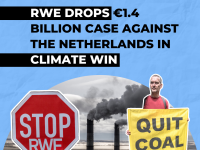RWE Drops €1.4 Billion Case Against the Netherlands in Climate Win

© Greenpeace / Joris van Gennip & Bas Beentjes
After the Netherlands implemented a sweeping ban on the use of coal in electricity generation by 2030, energy giant RWE took the country to arbitration court to demand €1.4 billion in compensation for the impact on its massive new coal plant in Eemshaven. RWE decided to drop the litigation in October 2023 when it was dealt a series of legal defeats in Germany and the Netherlands.
“This ruling is an important victory for the climate and the phase-out of fossil fuels. The ruling prevents polluting companies that knowingly invest in climate-disrupting activities from evading responsibility. They must now pay for their investment decisions themselves.” - Bart-Jaap Verbeek, Researcher at SOMO (Centre for Research on Multinational Corporations)
RWE
RWE, which is based in Essen, Germany, was the largest greenhouse gas emitter in Europe in 2021. Close to 80 percent of RWE’s electricity generation in 2020 was from non-renewable sources. Notably RWE owns the Garzweiler and Hambach coal mines in Germany’s Rhineland region where thousands have staged protests since 2012, most recently over the destruction of the village of Lützerath.
Eemshaven
Climate activists have long opposed RWE’s plan to build the Eemshaven coal plant, near the city of Groningen in the Netherlands because of its potential impact on the Wadden Sea, a UNESCO world heritage site - one of the last remaining large-scale intertidal ecosystems. Despite major protests and environmental lawsuits, RWE completed construction and inaugurated the plant in 2015.
Lawsuits
In 2019, Netherlands banned the use of coal in electricity generation by 2030, effectively shutting down Eemshaven. RWE sued the Netherlands in the Hague to overturn the ban but lost. Meanwhile in 2021, RWE also decided to sue at the Federal Court of Justice in Karlsruhe, Germany, under the Energy Charter Treaty, an international agreement between 55 countries that allows companies to sue governments for harming profits in energy investments.
“If anyone was waiting for the final proof that RWE is the opposite of a climate leader, this is it: Europe’s biggest CO2-emitter is suing the Netherlands for taking the most basic steps to align with the Paris Agreement by exiting coal.” - Lucie Pinson, founder of NGO Reclaim Finance.
Energy Charter Treaty
In 2022, the Netherlands announced that it would withdraw from the Energy Charter Treaty. This was followed by a decision by the European Union do the same in July 2023 arguing that the Treaty was incompatible with the climate goals of the European Green Deal and the 2015 Paris Agreement on climate change.
Victory
In 2021, Mobilisation for the Environment (MOB), a Dutch NGO, won a court ruling against a new nature permit for the Eemshaven plant. Then Uniper, a Düsseldorf-based energy company that was nationalized by Germany, withdrew a compensation claim against the Netherlands under the Energy Charter Treaty. RWE realized it was destined to lose, so it finally dropped its arbitration claim in October 2023.
Company Response
“RWE expressly supports the energy transition in the Netherlands and measures to reduce CO2 emissions. We do not by any means question the coal phase-out decided by parliament. However, we do not consider it right that the law does not provide for compensation for the resulting disruption to the company’s property.” - Roger Miesen, CEO of RWE Generation
This is #76 in our series of Instagram infographics on resistance against corporate power.
Click here to see the full post on Instagram.
📷 © Greenpeace / Joris van Gennip & Bas Beentjes
STOP-Verkehrszeichen ergänzt durch RWE als Protest gegen Braunkohle by Marco Verch



